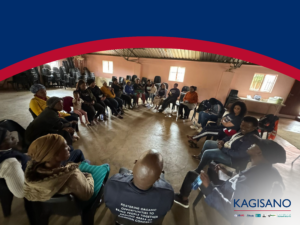
By Angela Mogorosi and Chipo Marunda
In times of conflict and tension in our communities, achieving peace often feels like a distant dream. Nevertheless, within the turmoil, there is hope, fuelled by grassroots peacebuilding efforts. These initiatives are driving meaningful change from the bottom up.
At the heart of peacebuilding efforts are dedicated peacebuilders, deeply connected to their communities and actively tackling various forms of conflict. Whether it is addressing gender-based violence, gang conflicts, or violence in schools, these individuals are pivotal in the pursuit of peace. Drawing on their expertise and local knowledge, we have seen them form a collective force ready to confront the underlying causes of violence head-on.
The key lessons on strengthening peacebuilding teams are having a mindset shift away from reliance on elected leaders and focus more towards encouraging public participation. True transformative power lies within communities themselves. By empowering citizens to participate in decision-making processes we cultivate ownership of peacebuilding programmes and ensure solutions are tailored to local realities.
Experience has taught us that the path to peace is riddled with setbacks and challenges, but resilience lies in consistency and collaboration. The peacebuilders in the areas in Northwest and Gauteng, often unite individuals with a shared vision, amplifying the impact of collective action. A notable success story arises from our efforts to address the marginalisation of certain groups such as the LGBTQIA+, and people living with disabilities within municipal frameworks in Northwest. Through collective mobilisation and advocacy, peacebuilders confronted cemented barriers, gradually paving the way for tangible change. At present, there is better partnership with a structure that support peacebuilding activities of marginalised groups. Currently, we are in a phase of seeking financial assistance in support if peacebuilding activities, with the municipality actively exploring options.
Empowering individuals within communities to take the lead is central to the effectiveness of peacebuilding initiatives. Programmes like Kagisano prioritise a bottom-up approach, recognising the insight and involvement of those familiar with local dynamics. By offering guidance and support rather than control, these initiatives unlock the full potential of grassroots leadership, paving the way for sustainable change.

Effective communication is vital for bridging divides and fostering understanding in peacebuilding activities. Through dedicated training sessions and a commitment to inclusive dialogue, barriers are dismantled, and pathways to resolution are clarified. Embracing diverse forms of expression, from language to verbal discussion and nonverbal cues, ensures that every voice is heard and valued.
To ensure effective communication in our peacebuilding activities, we use WhatsApp groups to coordinate efforts and amplify voices. Through these groups, peacebuilders embrace a mindset of continuous improvement, adapt, and improve their strategies, learning from shared experiences and diverse perspectives.
As we look ahead, we recommend several guiding principles for fostering enduring peacebuilding efforts:
- Cultivate collaborative partnerships to collectively address violence prevention.
- Invest in the capacity-building of peacebuilders through skills development workshops.
- Prioritise the identification and empowerment of active individuals within communities.
- Ensure sustainability by fostering ownership and agency among local stakeholders.
Our journey towards peace building is neither swift nor straightforward. Through our experiences, we have learnt that driving sustainable peacebuilding efforts requires harnessing the power of community-driven initiatives, embracing inclusive dialogue, and ensuring community peacebuilders are at the forefront and in this way transformative change becomes inevitable.
Angela Mogorosi is the Kagisano Peace Ambassador Leader, a Civic Education Consultant and Activist.
Chipo Marunda is the Project Manager for ACTION Support Centre, an implementing partner in the Kagisano Programme.